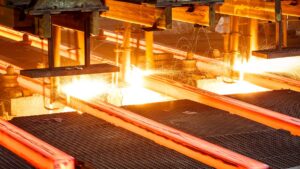Monsters of Rock: ASX 200 prepares for major shake up as BHP shareholders approve unification

Pic: Getty
In less than two weeks BHP (ASX:BHP) will be whole again after shareholders in London and Melbourne voted overwhelmingly to collapse its dual structure on Thursday night.
It comes 20 years after BHP merged with Billiton to create the two-headed monster that was the DLC.
The move had a minority of knockers, particularly from Australian investors who said the 1-for-1 offer disadvantaged them given the Australian shares trade at a premium to the British stock.
But arguments from the iron ore giant’s board that it would save administrative costs and make it more nimble to M & A opportunities won the day with around 96% of the Australian votes and 97% of the London votes falling in their favour.
Both votes required 75% approval for the motions to pass.
“In terms of the quantitative benefits the direct cost savings are in the order of $3 or $4 million per annum and that’s with the removal of dual AGMs, additional share registers and those sorts of administrative costs,” chairman Andrew Mackenzie said at the BHP Group general meeting.
“There’s also the important NPV benefit associated with structurally redistributing franking credits rather than them all going through the DLC, that they go directly to limited shareholders.
“That will be in the billions of dollars.”
It will also enable shareholders to get the franked dividend directly from the in-specie distribution of Woodside shares in the upcoming spinout of BHP’s petroleum business into the Australia oil and gas producer.
The qualitative benefits will include “agility” to pursue opportunities going forward.
What does it mean for investors at large and why does it matter to you, even if you aren’t a BHP shareholder?
BHP to make up a tenth of the ASX 200
Much investment on the ASX is traded not in companies, but in funds either directly linked to indexes or index-based funds run by active managers.
Those tied to major indices like the S&P ASX 200 can’t be overweight or underweight on particular stocks.
With the unification all of BHP’s market cap will come under the Australian banner, growing its share of the ASX’s benchmark group from ~6% to 10%.
As S&P has decided to let this happen in a single session on January 31, rather than over two seperate sessions as it contemplated at one point, this could lead to lots of volatility.
“Potentially the lion’s share of the ASX 200 benchmark funds are going to be underweight BHP,” Tribeca Investment Partners head of research Todd Warren said.
“And they need to make some decisions whether they want that to still be the case. In which case, you probably see significant demand for BHP shares as and when that index change occurs at the end of the month.”
That could see billions move into BHP stock in short time.
“It depends on when it occurs, it depends on how the indices or index funds that are tracking the ASX 200 do their rebalance and it would depend on the rules associated with those those index funds,” Warren said.
“Are they able to rebalance in advance of an event occurring or do they need to wait for that event to occur before they do the rebalance?
“Either way … the estimations are something like $10.5 to $11 billion worth of stock they need to change hands, which is six weeks’ worth of volume or thereabouts, so it’s a pretty big move. And so yes, you can expect some strength in your share price.”
More demand could come from short covering from investors who shorted the premium Australian shares ahead of the vote.
“The flip side to all of that is of course, those PLC shareholders who will be lightened of their PLC shares and issued with Limited shares instead, there may be if they haven’t acted already some shares that come out as a result of that.”
Outside of BHP reweighting by index funds will likely cause volatility in other ASX 200 stocks which need to be traded in the rebalance.
Unification makes sense
Warren said Tribeca “did well” out of the vote having gone long on the British PLC and short Australia in anticipation of the announcement.
But outside of that the support of proxies and investors for the collapse made sense, he said.
“To step back slightly from that, we were very supportive of the collapse because frankly speaking, you essentially had two companies that were trading under one banner, which clearly comes with a level of administrative burden and complexity, which ultimately is detracting from value,” he said.
The move will mean less waste of franking credits on inter company transfers, as Mackenzie argued, and make it easier for BHP to issue share buybacks.
But the broader aim is the availability of scrip for major deals, something long foreshadowed by CEO Mike Henry.
Analysts are dubious about those at the moment given their scale, complexity and legacy issues, but Warren says BHP has made no secret of their desire to buy assets that can grow its exposure to ESG-friendly commodities linked to the decarbonisation thematic.
In particular, BHP’s copper and nickel divisions need restocking after the company made them a priority in recent years. With the development of the multi-billion dollar Jansen potash project now approved it could also be keen on potash having failed in a US$40 billion bid for PotashCorp (now part of Nutrien) in 2010.
“What we haven’t really seen to date in this latest commodity bull market is major mining M & A, so it will happen,” Warren said.
“And I think whether it’s BHP and or others, we very much expect the activity to continue because, frankly speaking, it’s still cheaper to buy than build, and obviously a whole lot easier.
“Obviously the headlines around Rio and Jadar in Serbia today only serve to reinforce that.”
BHP (ASX:BHP) closed down 4.81% Friday as markets were savaged despite higher commodity prices across the board, with materials off 3.52%.
Only gold miners avoided the sell off, with Northern Star (ASX:NST) up 1.03% to lead the large cap sector.
BHP share price today:
Related Topics
UNLOCK INSIGHTS
Discover the untold stories of emerging ASX stocks.
Daily news and expert analysis, it's free to subscribe.
By proceeding, you confirm you understand that we handle personal information in accordance with our Privacy Policy.








